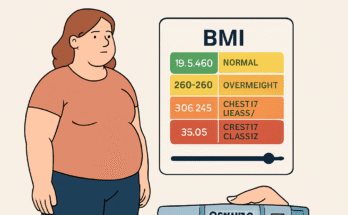As a weight loss specialist researching Ozempic, I often hear from patients worried about blurred vision as a side effect. It’s a concerning symptom—nobody wants to struggle with unclear eyesight, even if it’s temporary. For those using Ozempic (semaglutide) to manage type 2 diabetes or support weight loss, questions like “Does blurred vision from Ozempic go away?” or “Is it safe to continue Ozempic with vision issues?” are common. These are among the most searched queries on Google, reflecting the real concerns of patients. In this guide, I’ll address these questions using the latest research, explain why blurred vision happens, whether it resolves, and how to manage it. My goal is to provide clear, evidence-based answers in a way that feels approachable, drawing from my experience to help you make informed decisions about your treatment.
What Is Ozempic and Why Does It Cause Blurred Vision?
Ozempic is a weekly injection primarily approved by the FDA for type 2 diabetes. Its active ingredient, semaglutide, is a GLP-1 receptor agonist that mimics a hormone to control blood sugar, slow digestion, and reduce appetite. These effects make it highly effective for diabetes and weight loss, with clinical trials like the STEP programme showing an average 14.9% body weight loss over 68 weeks. A higher-dose version, Wegovy, is FDA-approved for weight management.
Blurred vision isn’t a common side effect but does affect some patients. In my practice, I’ve found it often stems from rapid changes in blood sugar levels. When Ozempic lowers glucose quickly, it can alter the fluid balance in your eyes, temporarily changing the lens shape and causing blurry vision. This is similar to vision changes seen in diabetes when blood sugar fluctuates. Less commonly, blurred vision might relate to dehydration from side effects like nausea or, in rare cases, serious issues like worsening diabetic retinopathy. The FDA notes vision changes as a possible side effect, particularly early in treatment.
Will Blurred Vision from Ozempic Go Away?
One of the top questions I get is, “Does blurred vision from Ozempic go away?” For most patients, the answer is yes—it’s usually temporary. In my experience, this side effect often resolves within 1 to 2 weeks as your body adjusts to Ozempic and blood sugar levels stabilise. Clinical trials, including the STEP programme, report visual disturbances in less than 1% of patients, and these are typically mild and short-lived. The FDA’s safety information on semaglutide confirms that vision changes are uncommon but can occur, especially during the initial weeks of treatment.
However, if blurred vision persists beyond a few weeks or worsens, it’s a signal to take action. In rare cases, it could indicate a more serious issue, such as diabetic retinopathy progression, where high blood sugar damages retinal blood vessels. A 2020 study suggested a potential link between GLP-1 agonists and retinopathy in some diabetic patients, though the evidence isn’t definitive. I always tell my patients to report ongoing vision issues to their doctor immediately to rule out complications.
What Causes Blurred Vision with Ozempic?
Understanding why blurred vision happens helps address concerns like “Why is my vision blurry on Ozempic?” Several factors can contribute:
- Blood sugar changes: Rapid glucose drops, common when starting Ozempic, can affect the fluid in your eyes, altering vision temporarily.
- Dosage: Starting at 0.25 mg and increasing to 0.5 mg or higher can trigger side effects, including vision issues, if the dose rises too quickly.
- Pre-existing eye conditions: Patients with diabetic retinopathy or other eye issues may be more susceptible. I recommend a baseline eye exam before starting Ozempic.
- Dehydration: Gastrointestinal side effects like nausea or diarrhoea can cause dehydration, which may contribute to blurred vision.
In my research, I’ve seen that gradual dose increases reduce the likelihood of side effects like blurred vision, giving your body time to adapt.
How to Manage Blurred Vision on Ozempic
If you’re asking, “How can I manage blurred vision from Ozempic?” there are practical steps I recommend based on my work with patients:
- Talk to your doctor: If blurred vision lasts more than a few days or is severe, contact your healthcare provider. They might adjust your dose or suggest an eye exam.
- Monitor blood sugar: For diabetic patients, regular glucose checks can help ensure levels aren’t fluctuating too much, which can affect vision.
- Stay hydrated: Drink plenty of water to counter dehydration from side effects like nausea or diarrhoea, which can worsen vision issues.
- Avoid risky activities: Don’t drive or operate machinery if your vision is impaired, to stay safe until it clears.
- Consult an eye specialist: An ophthalmologist can determine if your symptoms are Ozempic-related or due to another condition.
Most of my patients find that these steps, combined with patience, resolve blurred vision within a couple of weeks.
When to Seek Urgent Medical Help
While blurred vision is often temporary, certain symptoms require immediate attention. I advise my patients to seek help if they experience:
- Sudden or severe vision loss.
- Blurred vision with eye pain, floaters, or flashes of light.
- Symptoms persisting beyond 2 weeks.
These could signal serious conditions like diabetic retinopathy or, rarely, issues unrelated to Ozempic. The FDA’s approval data for semaglutide stresses monitoring for vision changes, especially in patients with pre-existing eye conditions.
Cost Considerations for Ozempic
Ozempic’s cost can be a hurdle, with a monthly supply ranging from $900 to $1,300 without insurance, depending on the dose and pharmacy. If blurred vision leads to extra doctor or specialist visits, these expenses can add up. Insurance often covers Ozempic for diabetes, but weight loss coverage is less common. Novo Nordisk’s savings card can help eligible patients lower costs. I encourage checking with your insurance provider or exploring manufacturer assistance programmes to make treatment more affordable.
Enhancing Ozempic with Lifestyle Changes
Ozempic works best alongside healthy habits. In my practice, patients who pair it with a balanced diet—rich in vegetables, lean proteins, and whole grains—and regular exercise (150 minutes of moderate activity weekly) see better results and fewer side effects. Stable blood sugar from healthy eating can also reduce vision issues. If blurred vision is affecting you, small steps like staying hydrated or taking short walks can support your body during treatment.
Frequently Asked Questions
Does blurred vision from Ozempic go away?
Yes, it’s usually temporary, resolving within 1 to 2 weeks as your body adjusts to Ozempic. Persistent symptoms need a doctor’s evaluation.
Has anyone gone blind on Ozempic?
A small study published in JAMA Ophthalmology analyzed data from nine patients who developed severe vision issues, including sudden blindness, while taking semaglutide (Wegovy, Ozempic) or tirzepatide (Mounjaro, Zepbound).
Can Ozempic mess with your vision?
Studies on Ozempic have shown that GLP-1 agonists can significantly help people with Type 2 Diabetes control their blood sugar. However, studies also showed GLP-1 agonists can cause vision changes, including blurred vision, worsening of diabetic retinopathy and macular complications
Why is my vision blurry after taking semaglutide?
One of the side effects that some patients may experience is temporary blurred vision. This occurs because fluctuations in blood sugar levels can affect the lens of the eye, leading to changes in vision. This issue is particularly common in older patients.
How can I prevent blurred vision on Ozempic?
Start with a low dose, stay hydrated, monitor blood sugar, and get an eye exam to catch any underlying issues early.
Conclusion
Blurred vision from Ozempic is usually a temporary issue that fades within a couple of weeks as your body adapts to the medication. In my work as a weight loss specialist, I’ve seen most patients manage this side effect by working closely with their doctor, keeping blood sugar stable, and staying hydrated. Persistent or severe vision changes, though rare, require prompt attention to rule out serious conditions like diabetic retinopathy. Ozempic remains a powerful tool for managing diabetes and weight loss, but it shines brightest when paired with healthy habits and medical guidance. If you’re experiencing blurred vision or considering Ozempic, talk to your healthcare provider to ensure it’s the right choice for you.

Emily Harper is a board-certified nurse practitioner and certified obesity medicine specialist with a strong clinical background in metabolic health and GLP-1 therapies. With years of frontline experience managing patients on Ozempic, she brings both scientific knowledge and real-world insight to her writing.




